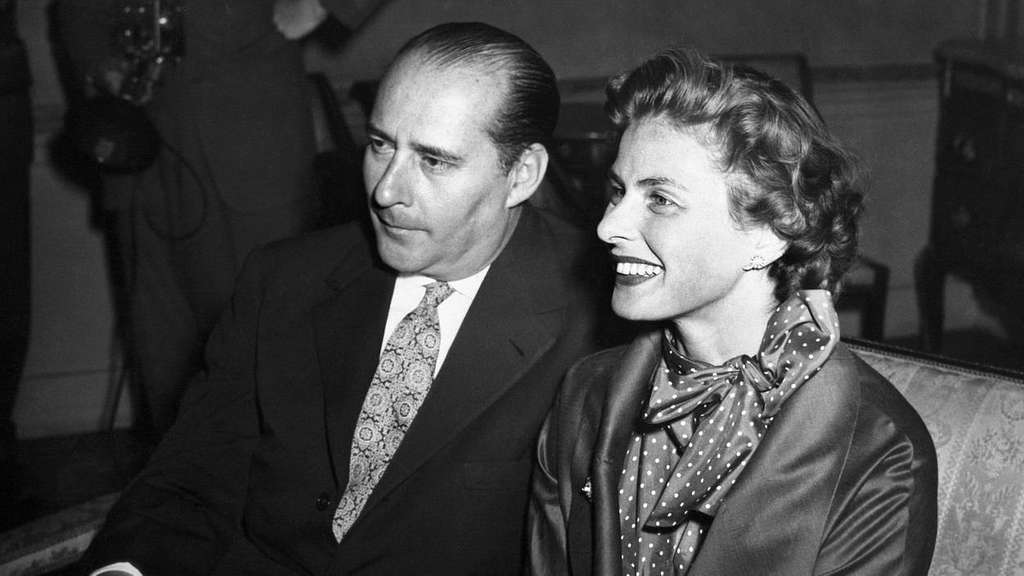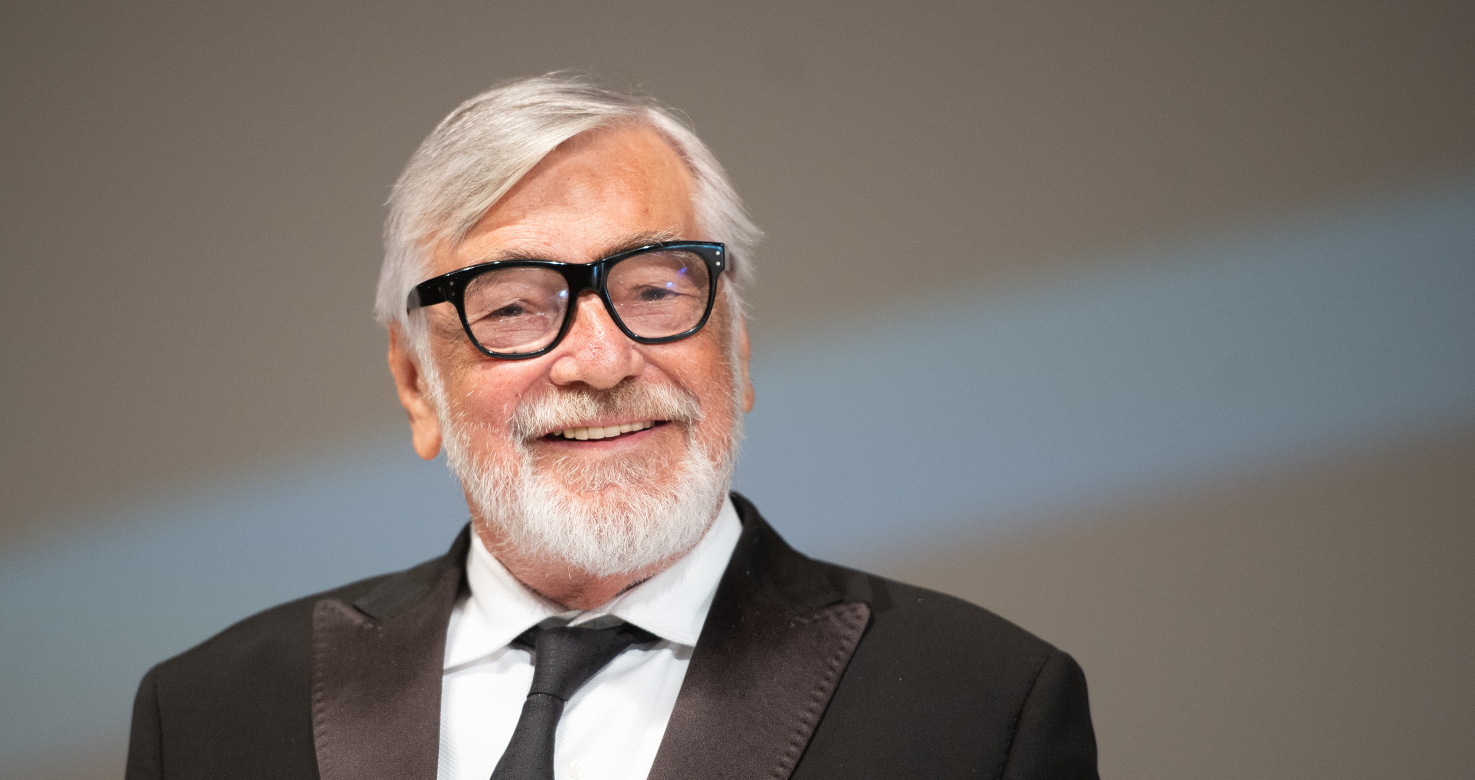Wim Wenders – Looking for Peace
Wim Wenders – Looking for Peace
Wim Wenders Receives the Lifetime Achievement Award
Wim Wenders Receives the Lifetime Achievement Award

I was twelve years old when I made my very first film, with an 8 mm camera. I stood by a window and filmed the street below, the cars and pedestrians. My father saw me and asked: ‘What are you doing with your camera?’ And I said: ‘Can’t you see? I’m filming the street.’ ‘What for?’ he asked. I had no answer.
by Michel Rebosura
Looking through the window. Just looking, just filming. Letting things appear. Giving space and time to places, characters, and stories. Capturing and preserving things that will have disappeared. A regained, lost world. Perhaps Wim Wenders has never made films any other way. «Wim Wenders» – the alliteration alone evokes images. A mood, an atmosphere, a vibe.
When the child was a child, it didn’t know it was a child. Everything was full of life, and all life was one.
(WINGS OF DESIRE)
Wim Wenders was born in Düsseldorf shortly before the end of the Second World War. He grew up in a world shaped by the ruins of the past, the Wirtschaftswunder of rapid post-war reconstruction, the Cold War, the Berlin Wall, the “leaden time” of the 50s, repressed memories of the national-socialist past, the protests of 1968, the German Autumn of 1977, marked by a series of attacks by the Red Army Faction, the conformist consumer society, and a general alienation. In everything, Wenders retained his childlike view of the world. His openness to everything, the individual, even the seemingly unimportant.
The tracks, the gravel, the timetable, the sky, the clouds. A man with a suitcase. An empty suitcase!
(KINGS OF THE ROAD)
Generally, the children in Wenders’ films! The ones playing with snow on lonely streets, the ones constantly asking direct questions such as «Why are you afraid of fear?», and the only ones who can see angels.
He doesn’t look into the audience; he looks up to heaven.
(WINGS OF DESIRE)
Growing up in a conservative Catholic home, Wenders wanted to become a priest until the age of 18 – until he discovered rock ‘n’ roll, pinball machines, and movies, so he abandoned his life plan. Over 50 years later, Wenders filmed the documentary Pope Francis: A Man of His Word (2018), going full circle.
My life was saved by Rock and Roll
(Velvet Underground)
Music was — and often still is — the starting point for Wenders. His debut and graduation film SUMMER IN THE CITY (1971) refers not only to a song by The Lovin’ Spoonful, but is also “dedicated to The Kinks”. However, as he did not own the song rights, the film could never be shown in cinemas. Ry Cooder’s slide guitar in PARIS, TEXAS (1984) remains unforgotten. Thanks to BUENA VISTA SOCIAL CLUB (1991), the whole world listened to son cubano, whether in student flats or parents’ homes. And with PERFECT DAYS (2023), we long to listen to music, and nothing else.
For the first time I see myself as someone who’s gone through a certain time, and that this time is my story
(KINGS OF THE ROAD)
After many years of wandering – from medicine to philosophy and sociology to painting, and finally filmmaking – Wim Wenders came to Munich to the newly founded Hochschule für Fernsehen und Film, where he would later teach as honorary professor. It was the time of the New German Cinema, with auteur filmmakers such as Kluge, Schlöndorff, Herzog, and Fassbinder. Like the Nouvelle Vague or New Hollywood, they wanted to radically renew post-war cinema, which was perceived as backward – «Papas Kino ist tot» (Daddy’s cinema is dead). Wenders oriented himself towards American film, especially the western with its landscapes, and the road movie.
When you drive around America, something happens to you. The images you see change you. (ALICE IN THE CITIES)
Wenders is first and foremost a traveller, and only then a filmmaker or photographer. Moving through space and time. Wandering around, far roaming, strolling, being open for contingencies. His road movie trilogy ALICE IN THE CITIES (1974), THE WRONG MOVE (1975), and KINGS OF THE ROAD (1976) for example, shows Wenders’ extraordinary respect for landscapes and places. The stories develop from these themselves, the poetics of space and logic of images, which is why the film plot was developed anew on each shooting day without a conventional script. This contrasts the commercial narrative films of Hollywood and (not only) American television.
The inhuman thing about American TV is not so much that they hack everything up with commercials, though that’s bad enough, but in the end all programmes become commercials. Commercials for the status quo. Every image radiates the same disgusting and nauseated message. A kind of boastful contempt. Not one image leaves you in peace, they all want something from you.
(KINGS OF THE ROAD)
Wenders finds images that leave you in peace, give you space and time, a greater freedom for imagination and interpretation. Characters who learn to see, experience and be wake again through the loss of language, memory and sleep. When words crumble in the mouth like mouldy fungi, even the smallest things can trigger an epiphany, angels can appear in every moment, and every fulfilled now contains a splinter of messianic time. Wenders’ narrative style is thus reminiscent of Ursula K. Le Guin’s carrier bag theory of fiction: in contrast to Hollywood’s heroic «killer stories», Wenders tells post-heroic «life stories» that assemble heterogeneous things.
My heroes are no longer warriors and kings, but the things of peace, one just as good as the next. The drying onions as good as the tree trunk that crosses the marsh. But no one has thus far succeeded in singing an epic of peace. What is it about peace that its inspiration is not enduring? Why is its story so hard to tell?
(WINGS OF DESIRE)
Wenders’ road movie as an epic of peace? Perhaps Wenders’ underrated «ultimate road movie» UNTIL THE END OF THE WORLD (1991) is more important than ever right now, when people are addicted to their own media dream images and are losing touch with reality and their fellow (more-than-) human beings, so that they don’t care about crises and wars, or even the end of the world.
Next time is next time. Now is now.
(PERFECT DAYS)
Wenders’ next film is about peace entitled PEACE BY PEACE (tbd). Now, he receives the Lifetime Achievement Award from the European Film Academy, of which he was a founding member and served as president from 1996 to 2020. With this in mind:
„Danke, Wim. And congratulations!“

Michel Rebosura
Michel Rebosura
Michel Rebosura lives with his family in Lucerne. As a philosopher, critic, and curator, he works at the intersection of academic, cultural, and artistic fields. He writes for Kunstbulletin, null41 – Magazin für Kultur, Politik und Gesellschaft der Zentralschweiz, and others. And he works at the Theater Neumarkt in Zurich and at the artist-run space sic! Elephanthouse in Lucerne. In 2024, he participated in the European Film Academy’s «A Sunday in the Country» for young critics and film journalists.








